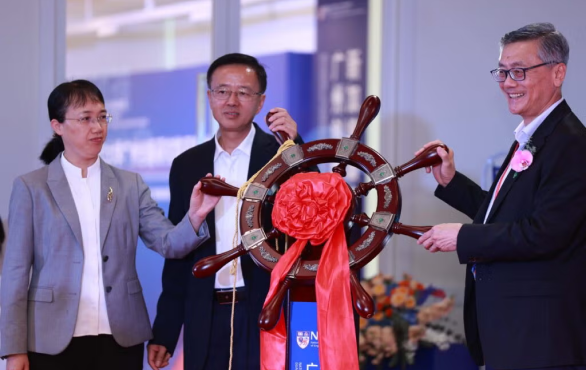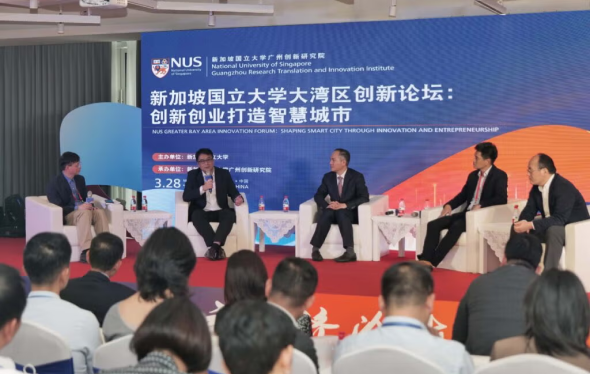
The University is setting up its fourth Research Institute in China to promote innovation and support start-ups in both countries.
The NUS Guangzhou Research Translation and Innovation Institute (NUSGRTII) in the south-eastern city of Guangzhou will be operational by the first half of 2022. It will train over 3,200 Chinese PhD and Master’s students, post-doctoral fellows as well as professionals over 10 years.
Located within the CSGKC, NUSGRTII will focus on education, research and collaborations in smart cities, infocomm technology, electronic science and technology, and advanced manufacturing.
It will also offer education programmes in technology innovation and entrepreneurship, starting with the full-time NUS PhD by Innovation Programme and the NUS Technology Access Programme which will both accept their inaugural batch in 2022. Other programmes include the Master of Science (MSc) in Venture Creation and post-doctoral training. These programmes will be conducted in Singapore.
Scholarships will be offered by the local district and city governments as well as corporate sponsors to support Chinese students for their studies at NUS.
Strengthening the innovation landscape
NUSGRTII’s proximity to multinational and local China companies will add on the synergy of knowledge and ideas exchange to accelerate and strengthen the innovation landscape in Guangzhou.
The MOU for NUSGRTII was inked in 2019, and the actual collaboration agreement was signed during the 17th Joint Council for Bilateral Cooperation and Related Joint Steering Council Meetings on 29 Dec.
“This cross-border collaboration is a strategic one where we will leverage on the capabilities of all the partners,” said Professor Freddy Boey, NUS Deputy President (Innovation & Enterprise).
“One of NUS’ focused areas is on building a vibrant research, innovation and enterprise ecosystem that is able to take theory into practice. It is exciting to ink this commitment, which will in turn help shape future impactful solutions that will transform both Singapore and Guangzhou.”
There will be a two-way flow of talents, technologies and start-ups where participants in China can gain access to NUS research, intellectual property and entrepreneurship programmes and courses in Singapore, said Prof Boey.
At the same time, these NUS alumni can further leverage on NUS’ market access capabilities to create their ventures in thriving Guangzhou and the Greater Bay Area. NUSGRTII will also promote the innovation and enterprise gateway between Singapore and China by supporting up to 300 China and Singapore start-ups in CSGKC over 10 years. These will consist of start-ups formed by programme returnees or any Singapore start-ups which are interested in scaling to Guangzhou or across China.
NUS and Singapore start-ups landing in the Greater Bay Area can also look forward to a new incubation facility – BLOCK71 Guangzhou helmed by NUS Enterprise – to kickstart their entrepreneurial journeys in Guangzhou and across China. This new facility, to be housed within NUSGRTII, is also expected to be operational in the first half of 2022.
NUS Enterprise has set up various BLOCK71 nodes globally which form NUS’ global network of entrepreneurial gateways to overseas hubs, enabling NUS start-ups and technologies to gain access to new markets, and vice-versa, to promote access to education and innovation programmes in NUS for overseas students and entrepreneurs. BLOCK71 hubs are currently located in Singapore, United States, China, Indonesia and Vietnam.
The NUSGRTII will be NUS’ fourth overseas research institute, after the NUS (Suzhou) Research Institute, the Tianjin University-NUS Joint Institute in Fuzhou, and the NUS (Chongqing) Research Institute.

(From right) NUS President Professor Tan Eng Chye; Mr Wang Guilin, Vice Chairman of the Guangzhou Municipal Committee of the Chinese People’s Political Consultative Conference, Director of Guangzhou Science and Technology Bureau; and Ms Xian Yinsong, Director-General, The People’s Government of Huangpu District, Guangzhou; officially opened the new building that will house the National University of Singapore Guangzhou Research Translation and Innovation Institute (NUS GRTII).
During the ceremony, NUS GRTII Director Professor Meng Qiang inked strategic collaboration agreements with 13 partners, one of which was WeRide, a tech company specialising in autonomous driving technologies. The ceremony also unveiled the first cohort of nine startups to be incubated at NUS GRTII.
The cohort included Singapore-based digital PCR tech company JN Medsys as well as Yimiji Technology, which develops AI-based medical image processing and analysis platforms and smart surgical robotics. NUS GRTII will support these ventures through business incubation, technology transfer and research commercialisation efforts that are poised to benefit Singapore, Guangzhou and the Greater Bay Area.
Education is also an integral pillar of NUS GRTII. Over the next decade, the institute is set to train more than 2,200 Chinese PhD and Master’s students, along with post-doctoral fellows and professionals in critical fields. Together, the Huangpu District Government, Guangzhou City Government and various corporate sponsors will offer scholarships that enable aspiring students to pursue their postgraduate studies at NUS in Singapore.
Education is also an integral pillar of NUS GRTII. Over the next decade, the institute is set to train more than 2,200 Chinese PhD and Master’s students, along with post-doctoral fellows and professionals in critical fields. Together, the Huangpu District Government, Guangzhou City Government and various corporate sponsors will offer scholarships that enable aspiring students to pursue their postgraduate studies at NUS in Singapore.

Following the inauguration ceremony, the NUS Greater Bay Area Innovation Forum: Shaping Smart City through Innovation and Entrepreneurship took place. The event leveraged Singapore’s expertise in building smart cities to address the evolving needs of the Greater Bay Area.
Discussions at the forum were abuzz with the importance of weaving cutting-edge technology into everyday city operations to enhance the well-being of citizens while promoting sustainable development. Professor Liu Bin, Deputy President (Research and Technology) at NUS, illustrated how advances in materials science could spark breakthroughs in biomedical research.
Meanwhile, Professor Lim Chwee Teck, Director of the Institute for Health Innovation & Technology (iHealthtech) at NUS, explored how AI could give healthcare a shot in the arm, giving a taste of the technologies developed at NUS — from pulsed electromagnetic field therapy to smart insoles designed to prevent slips and falls.

